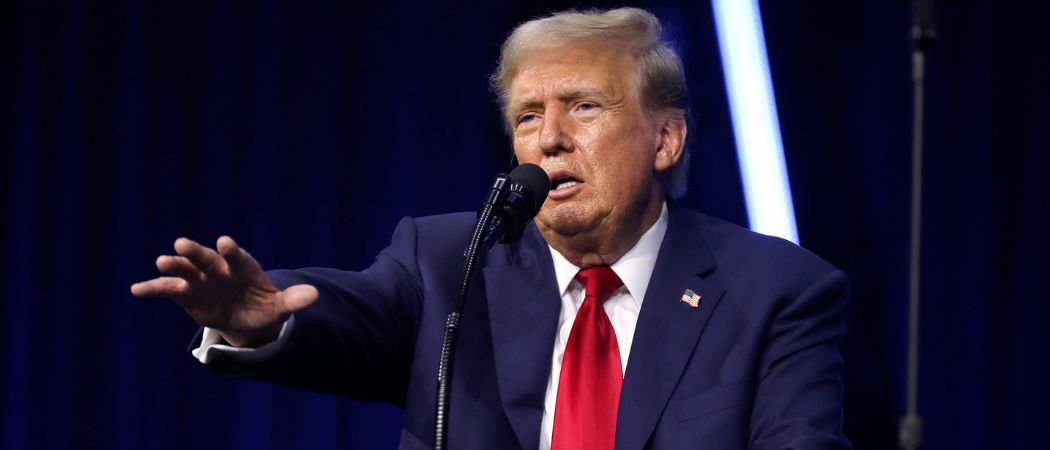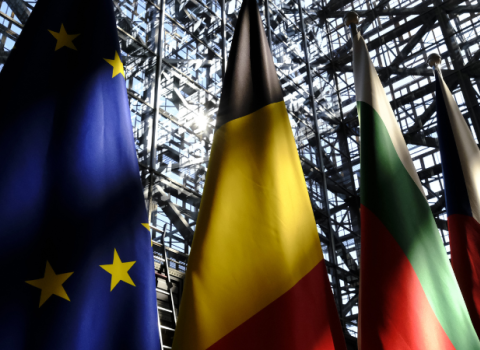EU policymakers and stakeholders want to see further strengthening of EU research and innovation, including in defence and dual-use technologies

President of the United States Donald Trump speaking with attendees at The People's Convention at Huntington Place in Detroit, Michigan, US, on June 15, 2024. Photo credits: Gage Skidmore / Flickr
Worries are mounting in Europe after Donald Trump won a second term in the White House, with the EU scrambling to chart a future in which it is less dependent on the US for defence and technology.
Politicians and stakeholders are pondering what the incoming US administration will mean for EU research and innovation.
Hungarian MEP Eszter Lakos says Trump’s win in the US could stifle American science and ties with Europe. She expects falls in government science budgets, after Trump said he would hire multi billionaire entrepreneur Elon Musk to oversee a federal cost-cutting programme, which could see €2 trillion slashed off US public spending. “This may affect research and innovation programmes and cooperation with Europe,” Lakos told Science|Business.
Trump’s win is, “a critical and urgent wake up for Europe”, said Manuel Heitor, chair of the EU expert group which recently published a report on future European research and innovation policy. The EU now has a unique opportunity to attract researchers from the US, “to come to Europe and strengthen the European R&I ecosystem,” he told Science|Business.
Mattias Bjornmalm, secretary general of CESAER, an association of science and technology universities told Science|Business the US election results mean the EU should be “moving decisively beyond the recommendations” in the recent reports by Heitor, Enrico Letta and Mario Draghi.
Each of the three reports said the EU needs to boost investment in R&D to maintain its global competitiveness in an increasingly volatile world. “Defending the strategic interests of the EU includes Europe assuming a globally leading role in science and technology,” said Bjornmalm.
He also acknowledged that change in Brussels usually take years of negotiations, but hopes this time things will move faster. “We must start piloting the bold, ambitious ideas from the Heitor report now, at the beginning of 2025,” said Bjornmalm. “Only by working together as a continent, including the UK and Switzerland, can we assume a globally leading role in advanced science and technology.”
Jan Palmowski, secretary general of The Guild of research intensive universities, agreed the EU needs to rely on its closest partners: UK and Switzerland. “Science is global, and when you look at the data from the Heitor Report, we are so far behind in artificial intelligence that we will need to collaborate not just within the EU, but also with close like-minded third countries, first and foremost the EEA, Switzerland and the UK,” he said.
Palmowski expects Trump’s win will generate increased pressure for military and dual-use research in EU programmes. The EU will also try to boost “challenge-led research and innovation spending in a few strategic areas” and steer R&D funding “towards short-term goals”.
The EU will need to reinforce research and innovation spending, both in Brussels and in member states, “even if that will be challenging alongside increased military spending,” Palmowski said.
Self-reliance
The prospect of another Trump mandate in the White House featured high on the agenda of parliamentary hearings on Wednesday. MEPs grilled Andrius Kubilius, who twice served as prime minister of Lithuania, and is now designated to become the EU’s first ever defence commissioner.
During his hearing on Wednesday, Kubilius told MEPs it’s difficult for him to predict the policies of the incoming Trump administration, but the EU should be making concrete plans for “a self-reliant defence structure” to protect itself against Russia. This should include investing more in defence R&D, since the US is “likely to increase its focus on the strategic challenge posed by China”.
Kubilius said Commission president Ursula von der Leyen has asked him to help Europe prepare for the “possibility of Russian aggression against EU member states” by the end of this decade. "We need to spend more, but not because of Trump - because of Putin,” he said.
The US began pivoting its foreign policy towards Asia and the Pacific more than a decade ago, under the leadership of President Barack Obama, but the EU has been slow to react to the new reality. In the meantime, Russia made steady advances as it was able to annex Crimea in 2014 without much resistance from the EU, partly because its economy heavily relied on imports of oil and gas from Russia.
It wasn’t until the full scale invasion of Ukraine that the EU cut off ties with Russia and speeded up plans to boost its defence industry, while member states started making moves to reach a national defence spending target of 2%, as required by NATO. The Commission says an additional €1.1 trillion would have been allocated to defence if member states had consistently spent 2% of GDP on defence from 2006 to 2020.
Investment in member states is not reaching the NATO target, and EU investment is also low. Currently, the EU’s main programme for defence R&D, the European Defence Fund, has a seven year budget of €8.5 billion. “Looking towards the longer-term perspective, we must significantly boost both public and private investment in defence R&D,” Kubilius said.
According to an analysis by the Atlantic Council, EU member states have rushed to buy off-the-shelf military equipment and weapons to fill the gaps in national arsenals. Defence spending increased by 10% from 2021 and 2023, with nearly a third of EU military acquisitions between June 2022 and June 2023 being sourced from the US.
Despite limited investment over many years, Bjornmalm says the EU has foundations on which to build its defence-related R&D capacity. Universities and research institutes across the continent have a long standing experience in this area. “Drawing on their experience in successfully combining excellence in civilian and defence-related research, education, and innovation, is critical as we move forward; we are not starting from scratch here,” he said.
Palmowski said the EU can pursue defence research, but defended the civilian purpose of the next Framework Programme for research and innovation, FP10. “I think it is important to protect and reinforce the importance of FP10 as a programme for civilian use, prioritising key societal challenges,” he said.
“This will also underline the EU’s attractiveness to global research collaborations, which will add to the EU’s scientific firepower at a time when our relative global R&I position has been declining,” said Palmowski.





 A unique international forum for public research organisations and companies to connect their external engagement with strategic interests around their R&D system.
A unique international forum for public research organisations and companies to connect their external engagement with strategic interests around their R&D system.